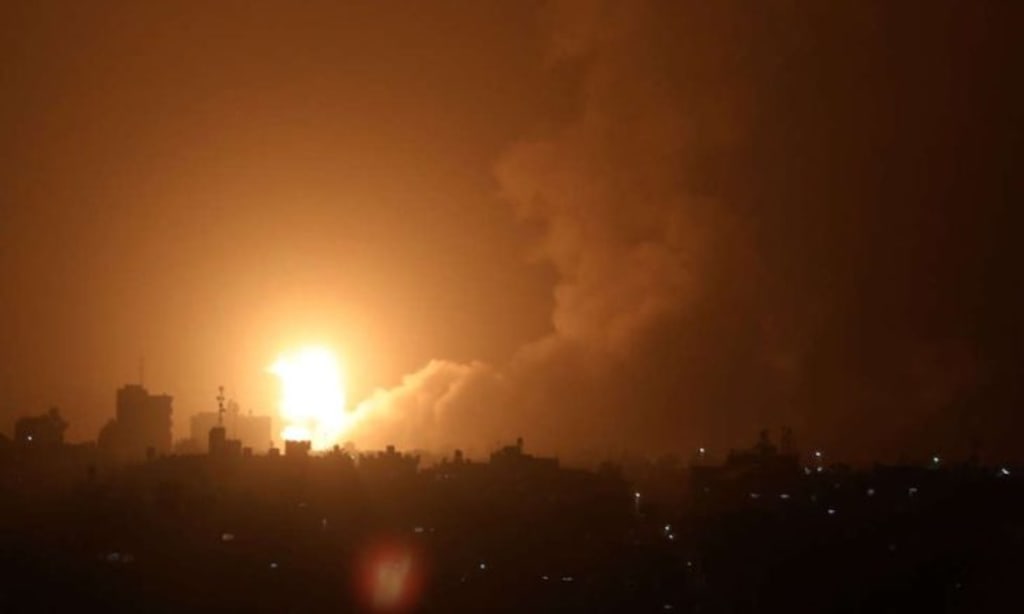“Palestinian Ramadan”, Iran’s bomb, the “web of the spider” speech, and Niedz’s warnings
What is Israel preoccupied with today?

The exchange of blows that began yesterday between Hamas and the Israeli army indicates that there is a clear tendency for escalation in the Gaza Strip, which will be very difficult to curb in the current reality. The Israeli army believes that Hamas is not interested in a war, and this may be true, but it undoubtedly strains the equations with Israel. The fire data from the Strip indicates an important change in Hamas's policy, giving at least a green light to other terrorist organizations to carry out rocket fire, as part of an attempt to establish a new equation according to which abnormal events are responded to by fire from the Strip, with the aim of trying to threaten the freedom of action of the Israeli army in the West Bank and East Jerusalem. And inside the sanctuary. Hamas cannot and does not want to continue to remain on the fence, and the initial indications of that are now here.
In just one month, beginning at the end of January, more than 40 rockets and anti-aircraft missiles were launched from the Strip. The siren lifestyle has returned to the cover after a long period of relative calm, during which months passed between one fiery event and another.
The Egyptians will try to calm things down again in the coming days. But the experience of the past indicates that resuming missile drops after a campaign that led to a certain period of calm leads to a flood that drags an important round of skirmishes or another campaign.
On a normal day, the news that IAEA monitors had found uranium enriched to a level of 84 percent in Iran would have been at the center of the Israeli government's agenda. But it's not an ordinary day. The same applies to the statement of the United Nations Security Council, which denounced the legalization of outposts in the West Bank.
The anti-nuclear struggle in Iran, which was at the center of Prime Minister Benjamin Netanyahu's vision in the past, has been relegated to the margins. As for the judicial revolution, the internal political agenda, the battles for powers within the government, the imminent economic crisis, the burning Palestinian arena in East Jerusalem and the West Bank, and the cold winds from Washington...all of these do not allow the prime minister to focus on his vision of curbing the nuclear program.
As a circus participant, he now needs a very large number of balls. Between one crisis and another, we find that the prime minister is tied up. Israel is now unable to focus on the political level with the countries of the world in running an effective campaign against Iran, which continues to exploit the war in Ukraine and the virtual absence of a nuclear agreement for the purpose of unprecedented progress on its part on the way to the nuclear bomb.
A country that defines nuclear weapons in Iran as an existential threat should have raised the issue to the top of its priorities. In diplomatic discourse, in deliberations between the professional and political level and others.
Netanyahu, who put the Iranian issue at the center of the table during his years in office, should be the first to ask: What did the last two months that he spent in power contribute to all this?
In Israel, this week they focused on the statements of the US ambassador to Israel, Thomas Needs, who said in an interview with “CNN” that the US administration had recommended to Netanyahu in everything related to judicial reform to hit the brakes. And Beneds was supposed to understand that this diplomatic expression of bluntness could be interpreted as an attempt to directly intervene in internal Israeli contexts. He later clarified and softened his words.
But what is more than the brakes, that the talk is practically about a direct message from the Biden administration. “The prime minister tells us that he wants to do big things, like Iran, the great threat to Israel and to the Middle East and the United States, and to expand the Abraham Accords with Saudi Arabia,” Needs said. “We have many things to work on together, and I told the prime minister a hundred times that working together is impossible if your backyard is burning.”
Between the two possibilities that are understood in the context of finding radioactive material in Iran at the level of 84 percent, the security apparatus estimates that it is an intended signal from the Iranians, who are examining the weak reactions in the world. A Persian bazaar at best, examining the region ahead of a possible decision, not yet taken in Iran, to enrich radioactive material to the 90 percent level needed for a nuclear bomb. The window of opportunity is closing, and it has never been closer.
Now, we find that Israel is required to look ahead and remember that it is not the central player in managing the crisis, and it needs the Americans. Netanyahu understands this very well, as we understand from the publication of the decision to freeze the legalization of more settlement outposts in the West Bank at this stage.
There has been very good cooperation between the Israeli and American army in recent months, but cooperation is also required on the political level. That is why Leoav Galant, as Minister of Defense, plays a very important role with the administration, which publicly expresses its dissatisfaction with Israeli policy, whether with regard to issues related to our democratic system or with regard to the confrontation with the Palestinians. The latest signals from the Americans should worry the prime minister, and all this while the Iranian issue is heating up.
Concern in Netanyahu's reserves
today at the crossroads of an important decision regarding his policy. The talk is about a mixture of American signals about the possibility of moving away from Israel, an escalating security tension in the Palestinian arena, and mainly a deep crisis in Israeli society. A crisis that threatens to dismantle the consensus necessary for joint service in the army, and overburden the solidarity of most of the different population groups in time of combat.
It is not surprising that the Secretary-General of Hezbollah, Hassan Nasrallah, who is one of the prominent officials responsible for the ugly situation in Lebanon, pounces on the crisis in Israel and revives the theory of the cobweb of Israeli society. We provide him with the goods ourselves. From week to week, crises become more dangerous, and polarization among the people is exacerbated. One can be for judicial reform and still ask if this is the way or the time to implement it in light of the many reverberations it is creating inside Israel and abroad. It is permissible to ask how the government's behavior in the last two months serves the greatest political security challenge that Israel has faced in recent decades due to the growing nuclear threat with Iran.
We may ask, how does it happen at a critical point in time, when the Iranian president is pushed into a corner, and the judicial revolution occupies the stage as the most important challenge to the new Israeli government - before the escalation in the Palestinian arena in recent months, before the challenges of internal governance and personal security, and even before the threats from Iran? Perhaps there are those who believe that the judicial revolution, when it comes, will bring salvation to all. As the source of all the problems are the professionals who have been interfering and obstructing Netanyahu for years from performing his duties.
In addition to all this, the Palestinian arena continues to rage and escalate. The day of the battle in Nablus the day before yesterday, the high number of Palestinian casualties, and the amount of fire that was fired at the forces, is evidence of the severity of the situation, which will remain very tense, while the Israeli army estimates that terrorist organizations will attempt to carry out revenge operations.
On the Palestinian issue, it is clear that Netanyahu and Galant are seeking to take a pragmatic line. To indirectly maintain relations with the President of the Authority, Abu Mazen, and to refrain from taking unilateral steps later. Netanyahu realizes that his scope of flexibility with the Americans is more narrow than his coalition promises, hence the tensions and major gaps within the right-wing government.
In addition to the high number of Palestinians killed in the operation that took place in Nablus, the terrorists, who barricaded themselves in the house and decided not to surrender until their death, express more than anything else their inclination in the field. The security apparatus talks about the possibility of an escalation in the month of Ramadan, but Ramadan is practically here now.
There is no need to classify the recent months as a third intifada in order to decide that this is the most dangerous escalation since the end of the second intifada, and all warning lights are blazing bright red. About 60 Palestinians, most of them armed, have been killed since the beginning of the year. These numbers are unprecedented even for the previous year, which was also considered complex.
In the meantime, there is a compromise formula about powers in the Ministry of Defense, but those who are familiar with the details claim that it will be difficult to implement in a reality test, so that the next coalition crisis seems only a matter of time.
With regard to internal challenges, army officials are very concerned about the escalation of confrontation in Israeli society. They are concerned more than anything else with the reserve apparatus, as many units from the reserve are sufficient to be tested in the coming months; Because the army will need it.
In recent years, there seems to be a clear decline in the desire and commitment to reserve service, and this is even before the rift that divides society. Now the army fears a further decrease in the rate of those who comply with the reserve service and warns of the transfer of the political crisis to the army, which will create a crack in the reserve system that will be difficult to mend. Many talk about a deep crisis that will not be possible to solve at the level of commanders in reserve or regular service.
(Written by: Tel Lev Ram)
About the Creator
News Correct
Information WorldWide MORE INFORMATION
Enjoyed the story? Support the Creator.
Subscribe for free to receive all their stories in your feed. You could also pledge your support or give them a one-off tip, letting them know you appreciate their work.






Comments
There are no comments for this story
Be the first to respond and start the conversation.